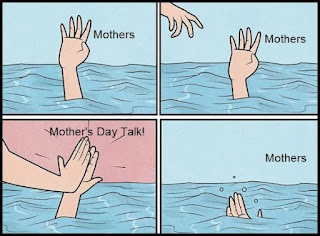I read this article recently and it helped me make sense of some events I have been mulling over trying to understand. There's a lot of nonsensical stuff happening in the news that I struggle to come to terms with, but this article, along with some good ol' Book of Mormon therapy, helped me take the fragmented pieces in my head and put them together to give me some clarity.
Empire Christianity
The central argument is that there are two versions of Christianity we have inherited. The first Christianity is the one that Christ lived and taught—that we love our enemies, (Luke 6:27) that we are willing to submit our will to God and His commandments and become like little children (Matthew 18:3) and that "he that is greatest among you shall be your servant." (Matthew 23:11)
The second version can be categorized as what the author refers to as “Empire Christianity.” In contrast to Christ's teachings, Empire Christianity is about consolidating power and influence. It is dogma focused rather than behavior focused. It is over-dressed, unusually fragile despite its flexing, and obsessed with its own image. It is eager to excuse itself for any bad behavior and quick to condemn it in others. While Christ rode into Jerusalem on a donkey, the author explains, Empire Christianity would ride in on a war horse with an extravagant military procession. It is less interested in a disciplined life, and more interested in maintaining and growing its own kingdom, by force if necessary.
It was this brand of Christianity that arose when apostolic teachings were amalgamated with conquest ideologies coming out of the Roman Empire. The merge was formalized around the 4th century AD, and though it is quite different from the original teachings of Christ, I think it would be unfair to say Empire Christianity totally replaced it. Much goodness was preserved as Christ's teachings spread across Europe in those early centuries, but Empire Christianity has been the tare growing alongside the wheat for a couple thousand years. A good portion of the drama playing out in our political and social landscape can be traced to that unholy union. It has brought up some serious points of tension in current events as a disconnect grows between Christ's teachings and how they're being used.
The Two Churches
 |
| "First Vision" by J. Kirk Richards |
Latter-day saints teach that there was a Great Apostasy in which Christ’s original priesthood was lost. Sometimes people talk about loss of authority, as if Christ's priesthood was just killed off when the apostles died, but I think it has more to do with wilfully giving in to worldly power structures, and the resulting corruption of Christ's original teachings. But whatever the reason, the situation was bad enough for Jesus Christ to say 1820 years after His death, as recorded by Joseph Smith, that all the different sects "draw near unto me with their lips, but their hearts are far from me; they teach for doctrines the commandments of men, having a form of godliness, but they deny the power thereof.” (JSH 1:19)
God's power is priesthood, and priesthood is necessarily based on Christ's teachings of radical love. Through it God's kingdom is established "without compulsory means [which] shall flow unto [them] forever and ever." (D&C 121:46) In our current mess and latest "war of words and tumult of opinions," the counsel of Jesus Christ to Joseph remains the same: "join none of them, for they are all wrong." (JSH 1:19) This can be startling doctrine.
Jesus condemns the use of His power and authority to build up oneself instead of using it to bless others, particularly the underprivileged. He called out the religious leaders of His day, labeling them a “generation of vipers." His harshest words were not for the sinners, the heretics, or the morally unclean. It was the self-righteous churchmen, the "holy rollers" of the day, those who were charged with ministering to the one but instead made life more difficult for them.
The Book of Mormon doesn't mince words either:
“Behold there are save two churches only; the one is the church of the Lamb of God, and the other is the church of the devil; wherefore, whoso belongeth not to the church of the Lamb of God belongeth to that great church, which is the mother of abominations; and she is the whore of all the earth.” (1 Nephi 14:10)
It is important to recognize that this has little to do with specific churches being right or wrong, but everything to do with the way Christ's priesthood and teachings are used. No matter the religion, whenever God's authority is joined with worldly systems of power to exploit, gratify, or consolidate one's own control and influence, that is the scriptural definition of “the great and abominable Church." And whenever Christ's power is used to bless another, regardless of the individual's religious affiliation or lack thereof, this is the Church of the Lamb.
Why am I writing this? Because I think it is important, now as much as ever, that we recognize how pervasive Empire Christianity is in our current political and social landscape. I think we, including members of the church, are getting duped too often, because Empire Christianity arrives packaged to us in all the appearance of familiar traditional religious practice, with all the right political and social cues, and it gratifies us in all the ways that feel good as we divide into teams and fight against all our perceived enemies.
"And it came to pass that I looked and beheld the whore of all the earth, and she sat upon many waters; and she had dominion over all the earth, among all nations, kindreds, tongues, and people." (1 Nephites 14:11)
A fine description of our current state of affairs. Religion, something designed to be the conduit of love and connection between people from different backgrounds has, in some instances, becomes the very form of oppression and control. That is one meaning of whoredom anyway, to take that which is sacred and ought to be used to build a relationship, whether it be sex or religion, and using it instead to exploit another for personal gain or gratification. We hear that kind of corruption in the voice of political pundits and politicians. We hear it whenever groups try to blame another group of people in the name of Christ to concoct our latest enemy, hollowing out the foundation of Christian love. Wherever Empire Christianity goes, contention and division follows, "for behold, at that day shall he rage in the hearts of the children of men, and stir them up to anger against that which is good." (2 Nephi 28:20)
Priesthood vs Unrighteous Dominion
What is the solution to all of this?
"And it came to pass that I, Nephi, beheld the power of the Lamb of God, that it descended upon the saints of the church of the Lamb, and upon the covenant people of the Lord, who were scattered upon all the face of the earth; and they were armed with righteousness and with the power of God in great glory." (1 Nephi 14:14)
Priesthood power is the defining attribute of the church of the Lamb, and the Spirit which accompanies it helps us recognize the clever decoys that try to replace it. As we become familiar with how priesthood works, we will be better able to recognize its counterfeits.
"No power or influence can or ought to be maintained by virtue of the priesthood, only by persuasion, by long-suffering, by gentleness and meekness, and by love unfeigned; By kindness, and pure knowledge, which shall greatly enlarge the soul without hypocrisy, and without guile." (D&C 121:41-42)
These are the defining characteristics of God's power, and though it is admittedly rare to see in practice (even sometimes in His church as we imperfectly hobble along) it is nevertheless unconquerable whenever and wherever it is found, for "charity never fails."
But priesthood power comes with a warning:
"We have learned by sad experience that it is the nature and disposition of almost all men, as soon as they get a little authority, as they suppose, they will immediately begin to exercise unrighteous dominion" and when that happens, "amen to the priesthood or authority of that man." (D&C 121:37-39)
This is always a sobering scripture for me to read and recognize the ways it applies to me in all the wrong ways. The more I try to follow Christ's example on how to work out differences, instead of my go-to weapons of cheerful manipulation, charming contempt, or friendly force, the more I realize just how difficult it is! But to be a disciple of Christ is to keep trying, and I am grateful to be given time, repentance, and God's patience as I figure this out.
The Book of Mormon Is Our Guide
On a political stage as much as a personal one, the Book of Mormon is the guidebook for the problems that plague us, to help us in our latter-day project to establish a world based on love instead of control and "unrighteous dominion." As it turns out, our problem is not very new. People were trying to figure this out before, even on the same American continent.
When I read about the unraveling of the Nephites and the Lamanites, it opens my eyes to both the problem and the solution. The Book of Mormon gives away the whole plot. Spoiler alert! If we don't get to the heart of Christ's teachings, which is to love our enemies, everyone dies. Civilizations end. Empire Christianity, something that seems to offer so much protection and control, will fail us.
The Book of Mormon breaks the spell we are living under as the world continues to hurl itself into the task of consolidating power, and the resulting tribalism as the project reaches its chilling conclusion. In the last days, as calamities unfold and as "many false prophets rise, deceiving many, and [as] iniquity abounds, [and] the love of many waxes cold" (Matthew 24:11-12) there is something new to try.
Instead of sharpening our ideological swords, the revolutionary solution the Book of Mormon offers is that we bury them. It's the same principle Christ gave in the Sermon on the Mount, "blessed are the peacemakers" which is also one of our centenarian prophet's most recent pleas.
It was not the sword of Laban given as the pattern to fight against all our latter-day Lamanites that was dragged out of that hill Cumorah. (2 Nephi 5:14) Like the Anti-Nephi Lehies, Moroni leaves it buried in the ground and instead gives us something better: the word of God, more quick and powerful than the sword. The Book of Mormon is a book that cries to us from the dust and implores "that [we] might learn to be more wise than [they] have been." (Mormon 9:31)






